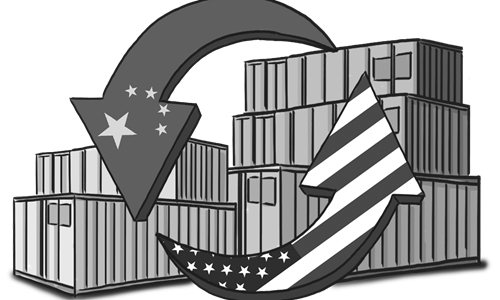HOME >> SOURCE
Trade deal must be mutually implemented
By Zhang Yansheng Source:Global Times Published: 2020/1/16 20:13:42

Illustration: Xia Qing/GT
The phase one trade deal between China and the US is a mutually beneficial agreement. With the presidential election kicking off this year, US President Donald Trump wants a deal that wins him more votes in agricultural, energy and services-sector states. China, on the other hand, is set to achieve a moderately prosperous society this year, which requires a stable and predictable external environment.Moreover, the deal will stabilize global expectations. The two parties in the trade war, which jointly contribute 60 percent of global growth, are too crucial to the world. The world needs a truce.
The US rolled back some tariffs in December, though China's expectation of the removal of all tariffs is still far from being met. The US has called off new tariffs on $156 billion worth in Chinese goods in December and slashed by half a 15 percent tariff on $120 billion worth of Chinese products.
China should bind the US with the agreement. The US may play tricks on the pace of tariff roll-backs - first, less important tariff items, then, more significant ones. But the country must abide by the agreement.
The implementation of the phase one trade agreement should not be one-way.
China has agreed to increase purchases from the US in the phase one trade deal. Will the US allow suppliers to sell devices to Huawei? If the US does not, how could China fulfill its side of the purchase agreement?
Purchases of US products must follow the WTO's principles and market economy principles. China can't force the US to sell. If the US refuses to sell, and China fails to buy enough to meet the target figure, who should we blame?
When to unlock phase two negotiations - and how to unlock them - depends on the implementation of the phase one deal. The US hopes to launch phase two negotiations as soon as possible due to its party rivalry, interest groups and election politics. For China, the processes of honoring promises, deepening reform and pushing high-quality growth are more important than immediate results.
The world has been offered relief with the signature of the phase one deal, but this will be a short break. It will be a long time before China and the US return from irrational conflict to rational cooperation. The clash between the two countries could enter further into technology, financial, energy and rule-making sectors. Despite this, it is better to have consultations than to have nothing - at least the two countries have had the opportunity to understand each other's bottom lines and have kept the conflict under control. The trade consultation mechanism is crucial for major powers.
Chinese people should decide upon their expectations. They do not want a trade war. As long as there is a truce, it will be good for enterprises. Postponing the outbreak of a trade war, companies now have the time to adjust their business strategies.
In the long run, China needs to be patient, composed and maintain its bottom line. Trade war is about rules and strength, and the US may be superior to China in this aspect. Thus, adapting to the trade war enhances China's rule-making ability and national strength. By contesting the US, China can improve its rule-making, technology, finance, energy and so on. China should also maintain its confidence in opening-up. Chinese culture, which is inclusive and capable of adapting, will not lose against that of the US. It will only lose when it shuts itself away from the outside world.
The author is chief research fellow with the China Center for International Economic Exchanges. bizopinion@globaltimes.com.cn
Posted in: EXPERT ASSESSMENT